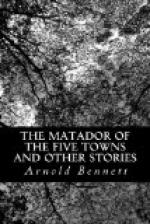The Fair was one of the two great drunken sprees of the year, the other being the Wakes. And it was meet that it should be so, for intoxication was a powerful aid to the signing of contracts. A sot would put his name to anything, gloriously; and when he had signed he had signed. Thus the beaver-hatted employers smiled at Martinmas drunkenness, and smacked it familiarly on the back; and little boys swilled themselves into the gutter with their elders, and felt intensely proud of the feat. These heroic old times have gone by, never to return.
It was on the Friday before Martinmas, at dusk. In the centre of the town, on the waste ground to the north of the “Shambles” (as the stone-built meat market was called), and in the space between the Shambles and the as yet unfinished new Town Hall, the showmen and the showgirls and the showboys were titivating their booths, and cooking their teas, and watering their horses, and polishing the brass rails of their vans, and brushing their fancy costumes, and hammering fresh tent-pegs into the hard ground, and lighting the first flares of the evening, and yarning, and quarrelling, and washing—all under the sombre purple sky, for the diversion of a small crowd of loafers, big and little, who stood obstinately with their hands in their pockets or in their sleeves, missing naught of the promising spectacle.
Now, in the midst of what in less than twenty-four hours would be the Fair, was to be seen a strange and piquant sight—namely, a group of three white-tied, broad-brimmed dissenting ministers in earnest converse with fat Mr Snaggs, the proprietor of Snaggs’s—Snaggs’s being the town theatre, a wooden erection, generally called by patrons the “Blood Tub,” on account of its sanguinary programmes. On this occasion Mr Snaggs and the dissenting ministers were for once in a way agreed. They all objected to a certain feature of the Fair. It was not the roundabouts, so crude that even an infant of to-day would despise them. It was not the shooting-galleries, nor the cocoanut shies. It was not the arrangements of the beersellers, which were formidably Bacchic. It was not the boxing-booths, where adventurous youths could have teeth knocked out and eyes smashed in free of charge. It was not the monstrosity-booths, where misshapen and maimed creatures of both sexes were displayed all alive and nearly nude to anybody with a penny to spare. What Mr Snaggs and the ministers of religion objected to was the theatre-booths, in which the mirror, more or less cracked and tarnished, was held up to nature.




